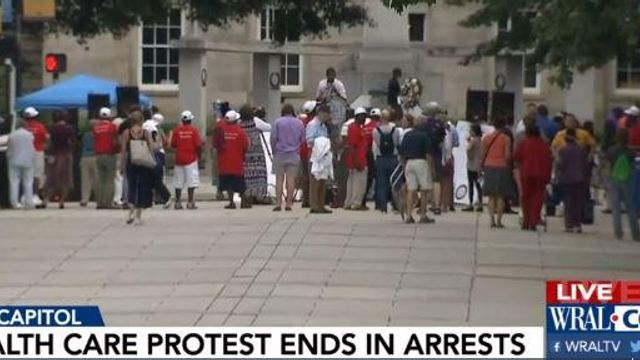Judge says protesters shouldn't be banned from Legislative Building
A Wake County judge plans to draft new pre-trial release conditions for people arrested during a protest at the Legislative Building, saying Wednesday that banning them from the building goes too far.
Posted — UpdatedThirty-two people, including NAACP president Rev. William Barber, were arrested during the May 30 protest over Republican lawmakers' refusal to expand the Medicaid program as allowed under the Affordable Care Act to provide health coverage for more low-income people.
NAACP attorney Geeta Kapur said during a court hearing for several of the protesters that the state constitution specifically grants people the right to "instruct" legislators. The General Assembly is a public forum where lawmakers work, so protestors can't be banned from it, she said.
Wake County Assistant District Attorney Vanessa Curtis argued that it's common for people charged with trespassing to be banned from the specific property involved until the case is resolved. The state has the power to impose reasonable restrictions on people's rights to avoid disrupting legislative work, she added.
"Where the exercise of someone's First Amendment rights interferes with the public purpose, it is appropriate that the government can step in and set reasonable limitations," Curtis told District Judge Michael Denning. "The state has a significant governmental interest in seeing that the work of its legislative branch may occur and that the individuals employed to work in this building feel safe."
Barber, whose case wasn't on the docket Wednesday, said the protest clearly didn't stop the legislative process.
"All of the things we're against, they still did," Barber said after the court hearing. "So, how can they claim that we disrupt? What we did disrupt is their ability to do it in secret. What we did disrupt is the consciousness of this state, and we exposed to the light what they're doing."
Curtis maintained that the banned protesters could use other means to communicate with lawmakers, such as phone calls or emails. But Barber said the Legislative Building belongs to the people of the state and should be open to all.
"We have the right – non-violently the right – to instruct and bring our grievances to our legislature, and they do not have a right to operate in a public space and attempt to make it their private residence," Barber said.
Denning agreed that banning protestors until further notice is too broad, but he said there will be some restrictions in the modified release conditions he plans to write.
Barber and Kapur said they will probably appeal any new conditions put on the protesters.
Although hundreds of people have been arrested in "Moral Monday" protests over the past several years, the May arrests have been the only ones in 2017.
Related Topics
• Credits
Copyright 2024 by Capitol Broadcasting Company. All rights reserved. This material may not be published, broadcast, rewritten or redistributed.






